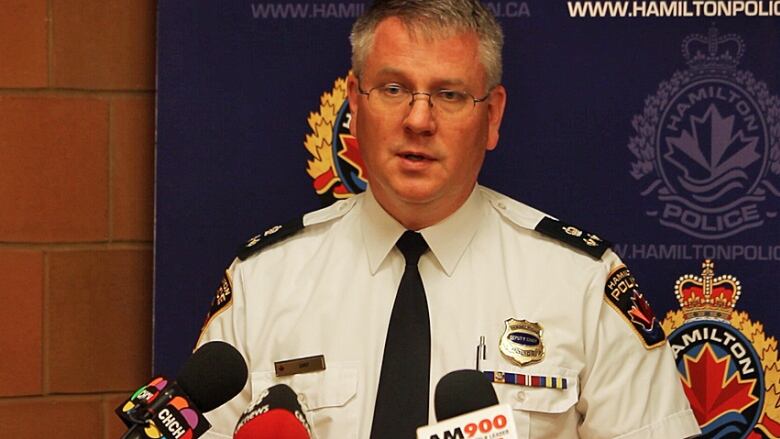Carding in Hamilton: 5 things we learned
Police report showed black people are disproportionately subject to street checks/carding

After months of refusing to publicly discuss the practice of stopping and taking ID from people on the street who aren't under investigation, Hamilton Police executives finally shed some light Thursday on the service's"street check" practice.
Street checks are when police stoppeople who have not necessarily done anything wrong to question them, often record their ID and whereabouts, and later enter that information in the police database, where it remains indefinitely.
Here are five things we learned:
Street checks = carding
Hamilton Police have previously firmly said they don't practice carding, which has been under fire for years in Toronto. But what they described Thursday revealedtheir street checks are the same thingeven down to contact information beingrecorded on a "card," which is how the Toronto practice came to get its colloquial name.
Hamilton Police ACTION officers have street check forms to fill out with information collected from people they stop and question who aren't under investigation. They're pieces of paper smaller than a recipe card that include fields for name, date of birth, names of someone's "associates," physical and race identifiers and other information.
The information is laterentered into the police records database, where itis retained indefinitely.
Visible minorities, especially black people, are disproportionately street checked
Police have been saying for years as recently as the chief's comments in Junethey don't keep race-based statistics. Keeping that datawould mean the cops couldprovide the kind of breakdown that has led to criticisms in Toronto, Kingston and Ottawa.
But we learned Thursday that they do keep race data and identifiers when they stop someone; they just haven't before analyzed that data.
Visible minorities make up about 15.7 per cent of Hamilton's population, according to 2011 Census numbers the Hamilton Police cited Thursday. But 25 per cent of street checks were conducted on visible minorities between 2010 and 2014.
The rate is especially disproportionatefor black people, who made up 3.2 per cent of Hamilton's population in 2011. Between 11 and 14 per cent of the street checks done in Hamilton were on black people between 2010 and 2014 -- a rate three to four times the population.
Street checks plummeted in 2014
Police did between 1,365 and 2,893 street checks in 2010, 2011, 2012 and 2013. But in 2014, the numbers plummeted. Police only did 188 street checks last year. They didn't include that total in the ACTION report released earlier this year, and Deputy Chief Eric Girt said he didn't know why that number hadn't been public before.
He attributed the huge drop in street checks to a "chilling effect" due to public attention in Toronto and elsewhere over police stops of people who are not under investigation. He said the police service is not happy about that drop.
"We certainly don't support that, because we believe in the utility of these checks," Girt said.
Personal information from street checks is kept in police database indefinitely
Information recorded from street checks over the past five years is in the police database and will remain there indefinitely, Girt said yesterday. Girt said the relevancy of information recorded might not become apparent for "a year, two years, three years" after the fact.
"Many of the street cards will ultimately serve no purpose," Girt said. "I get that. You don't know what is relevant and what is not until you find out later."
Girt said that what police release in background and vulnerable sector checks for job interviews, etc., do not include street checks.
Police are definitely not interested in telling people on the street they have the right to walk away
Girt's presentation cited case law suggesting that while citizens may not have a legal obligation to comply with an officer's questions they have a moral and social duty to.Meanwhile, Chief Glenn De Caireemphasized the policearen't legally obliged to tell citizens at the time of the stoptheir rights to walk away from a noncriminal encounter, even though they've added those rightsto their brochure and app.












_(720p).jpg)


 OFFICIAL HD MUSIC VIDEO.jpg)
.jpg)



























































































